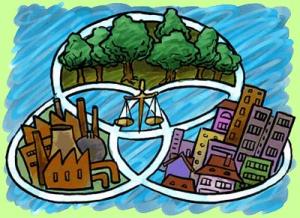
As modern society increasingly becomes a single, globalized civilization, the quality of life that post-industrial nations have come to expect is now is becoming achievable around the world. Living on a planet of finite resources, widespread development can only last so long; it’s not sustainable over the long-term. The Western ideals being spread to developing nations are material intensive and would be physically impossible to achieve.
Logic dictates that as natural resource supplies diminish, demand will increase along with price. In America we have already had the displeasure of witnessing this firsthand as the Arab Oil Embargo of 1973 created an energy crisis that skyrocketed oil demand and cost. This artificial shortage is just the tip of the iceberg compared to the inevitable depletion that our current habits would lead to.
For continued progress to become sustainable, the metrics we use to evaluate it must be changed. The economic development that drives modern society will need to be reflective of environmental and social concerns and hold corporations accountable for the costs they externalize. This is a method of evaluating known as the triple bottom line. Adapting this concept would mean resource-intensive businesses would no longer be profitable and our contemporary lifestyles would be unaffordable.
Climate change is looming just over the horizon, social disparity remains out of control and the world economy is in recession. There is no blanket solution that will solve these but a step in the right direction would be “efficiency.” Steven Chu cites energy efficiency as a priority in reducing greenhouse gas emissions, which would have the convenient side effect of saving consumers money and reducing air toxic air pollution. Innovative solutions will be needed to truly provide a sustainable future but society can start now by becoming more efficient.
Development as we know it now is absolutely not sustainable. Resources and people are exploited in the pursuit of profit and that approach simply won’t last forever. A tax on carbon emissions has been discussed to address immediate environmental concerns and could serve as a model for future attempts to prevent externalized costs. Sustainable development will only be possible once demand accountability, financially and in public opinion.
Sustainability isn’t just about protecting the environment like many people think; it’s about ensuring people quality of life. If there is one piece of my mother’s advice that best applies to sustainable development, it is to “treat people the way you want to be treated.” Instead of calling names and pulling hair, organizations pile up e-waste in China and pollute drinking water. I bet the CEO’s of these companies didn’t eat their veggies either.
Wesley Cronk is the Sustainability Director and co-founder of the SEEC Foundation. Currently a graduate student at New York University studying Sustainable Development and Environmental Policy, Wesley is a regular contributor at seecfoundation.org/blog .

